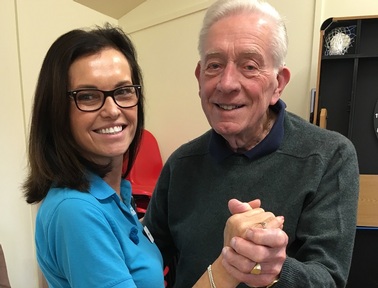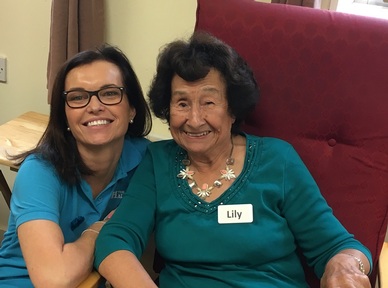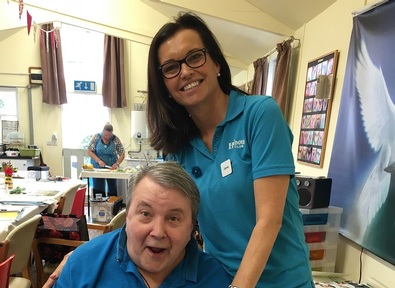Occupational therapy: 'The most holistic healthcare profession there is'
Jane Bussell, a specialist occupational therapist who works with older people living with dementia, says "we are all occupational beings that need purpose in our lives", adding "those with dementia are no different".
The former fashion designer runs the Harbour Club in Battlebridge, in Essex, a specialist day centre for people with dementia. She set this up in 2011 in memory of her father who had Alzheimer’s disease.

Training to be an OT was 'the hardest and best thing I have ever done'
Ms Bussell wasn’t always destined to be an occupational therapist (OT). She says: “I became an OT by accident. I was a fashion designer in a previous life, I left work to raise my two sons. When they were both at school I decided I wanted to go back to work but wasn’t keen to return to fashion.”
After doing some voluntary work at a local hospital and a special needs school, Ms Bussell realised she wanted to do more caring work. She said: “I loved it, it was the highlight of my week. I got to know the OTs and physios and they told me about a part time job vacancy as a rehabilitation assistant in paediatrics.”
She got the job, and after a couple of years her manager suggested she might like to train to be an OT. Five years later she qualified as an OT.
She says: “Training to be an OT as a mature student was the hardest and best thing I have ever done; it completely changed my life for the better, I love being an OT.”
“As an OT I believe that we are all occupational beings that need purpose in our lives, older adults with dementia are no different. We endeavour to ensure our clients can make choice of the types of activities that they would like to do, whilst socialising with their peers.”
‘Dancing the Twist around the day centre makes it all worthwhile’
The Harbour Club day centre is designed exclusively for the use of those with dementia and its associated conditions. She says: “To my knowledge there are very few dementia day centres run by specialist occupational therapists using OT approaches as a treatment medium to help maintain cognitive function."
Ms Bussell set up the Harbour Club because she felt, “At that time, there weren’t enough specialist services supporting people with dementia and as an occupational therapist, I felt occupational therapy offered the skills for the best intervention to do this.”

The day centre provides a service for 12 members a day, from 09.30-15.30. Throughout the day they provide cognitive stimulation therapy using a formal and informal format. Purposeful activities are the basis for everything they do.
Ms Bussell says: “We provide a safe environment, use therapy-based interventions – not just diversional activities, to provide a person-centred service for each of our clients.”
“My role can be very pressured at times and exhausting, but on a Monday afternoon when it’s raining outside, and I am dancing the ‘Twist’ around the day centre hall with clients and staff, all laughing and singing; working on improving their balance and co-ordination in a fun and engaging way, I know that what I do is worthwhile.”
Ms Bussell’s days are varied and consist of managing and supervising the smooth running of the day centre. One of the most important tasks is to assess and monitor clients’ needs and help support them. Some clients might have difficulty feeding themselves, whilst others might experience problems moving around the environment safely.
The OT liaises with carers and family members, giving advice and support on how best to care for their loved one, and offers practical advice, signposting carers to other local services to support clients in their dementia journey.
‘As a profession we are misunderstood’
The role of OT is one which is less known than, say, that of a care worker or a nurse, but it is a very holistic role, and an important one. Ms Bussell says: “In my opinion it’s the most holistic health care profession there is. The areas you can work in are varied and you can make a real difference to people’s lives.”

Ms Bussell believes the title of ‘occupational therapist’ confuses some people, and it can get mixed up with that of occupational health which is a job that involves someone overseeing the health and safety of a work environment. She explains: “To some extent I do feel that as a profession we are misunderstood. Our title ‘occupational therapist’ can be misleading and seen as part of the occupational health team.
“The variety of roles within OT profession is so vast covering from birth to death, physical and mental health, working in health, social care, 3rd sector and private organisations; providing a huge variety of assessments and interventions to encourage independence and purposeful engagement to overcome occupational deprivation, promoting overall health and well-being.”
Despite this, Ms Bussell thinks sometimes OTs are unfairly seen as a ‘luxury’ care service by some providers. She explains: “I do wonder if some care providers feel that occupational therapists may cost them more money and set unrealistic goals. I do however believe that OTs add value to any organisation and could be a huge selling point.”
homecare.co.uk has a wide range of jobs listed on its site. If you are looking for a job in the home care sector click here
Latest Features News
 28-Nov-19
2019 Election: Labour pledges £10.8 bn for free personal care while Boris Johnson sidelines social care
28-Nov-19
2019 Election: Labour pledges £10.8 bn for free personal care while Boris Johnson sidelines social care
 18-Oct-19
Podcast: Wendy Mitchell and dementia: 'My biggest fear is not knowing who my daughters are'
18-Oct-19
Podcast: Wendy Mitchell and dementia: 'My biggest fear is not knowing who my daughters are'
 30-Sep-19
World's oldest diver aged 96 says 'never accept the fact you are getting old'
30-Sep-19
World's oldest diver aged 96 says 'never accept the fact you are getting old'
 27-Sep-19
Exclusive: Care minister backs care workers' call for time off to grieve and attend funerals
27-Sep-19
Exclusive: Care minister backs care workers' call for time off to grieve and attend funerals
 20-Sep-19
Podcast: Gyles Brandreth urges care workers to learn poetry with elderly
20-Sep-19
Podcast: Gyles Brandreth urges care workers to learn poetry with elderly